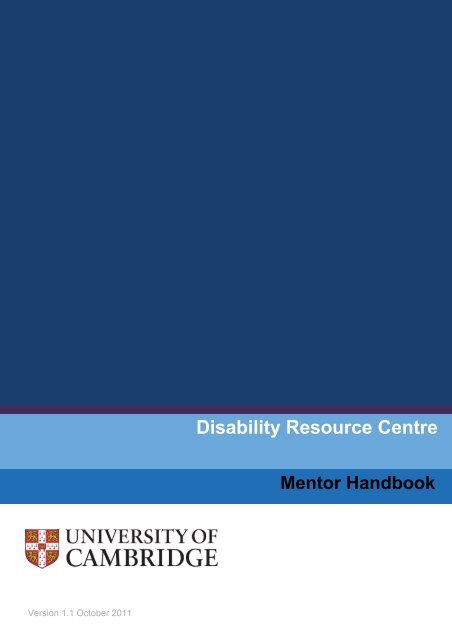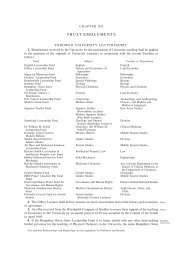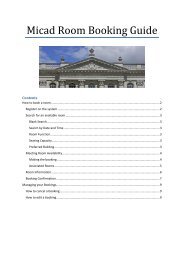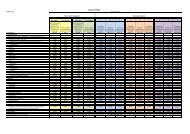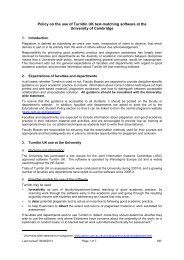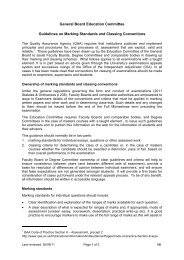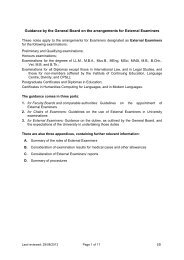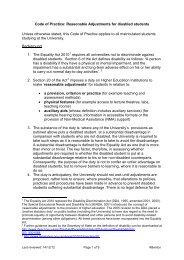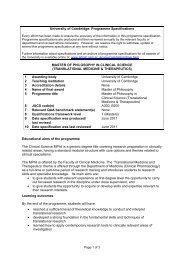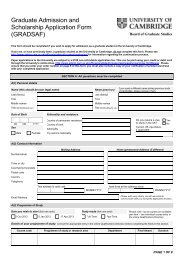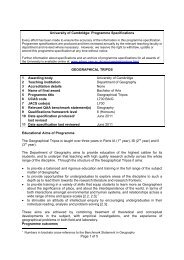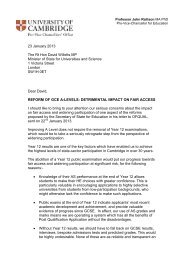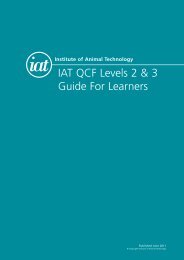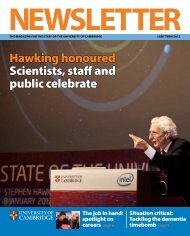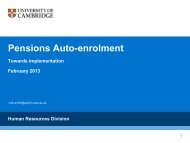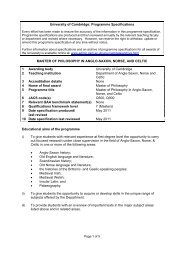Mentor Handbook Version 1.1 - the University Offices - University of ...
Mentor Handbook Version 1.1 - the University Offices - University of ...
Mentor Handbook Version 1.1 - the University Offices - University of ...
Create successful ePaper yourself
Turn your PDF publications into a flip-book with our unique Google optimized e-Paper software.
Disability Resource Centre<br />
<strong>Mentor</strong> <strong>Handbook</strong><br />
<strong>Version</strong> <strong>1.1</strong> October 2011
Index<br />
Disability Resource Centre……………………………………………………….<br />
<strong>Mentor</strong>ing - General Information...………………………………………………<br />
<strong>Mentor</strong>ing - Role and Benefits.. …………………………………………………<br />
<strong>Mentor</strong>ing - Dos and Don’ts……………………………………………………...<br />
<strong>Mentor</strong> - Qualities…………………..……………………………………………...<br />
<strong>Mentor</strong>ing Techniques - Asking Questions……………………………………..<br />
Ideas for <strong>Mentor</strong>ing……………………………………………………………….<br />
Working with your Student……..…………………………………………………<br />
Documentation for <strong>Mentor</strong>s………………………………………………………<br />
DRC Contacts………………………………………………………………………<br />
Useful Contacts...…………………………………………………………………..<br />
Useful Links and Resources………………………………………………………<br />
3<br />
4<br />
5<br />
6<br />
7<br />
8<br />
9<br />
10<br />
12<br />
13<br />
14<br />
15<br />
Appendices<br />
Appendix 1: <strong>Mentor</strong> Agreement……………………………………………..<br />
Appendix 2: Student/<strong>Mentor</strong> Agreement…………...………………………<br />
Appendix 3: <strong>Mentor</strong>ing Session Log…………..……………………………<br />
Appendix 4: <strong>Mentor</strong> Termly Update……………………………….………..<br />
16<br />
17<br />
19<br />
20<br />
2
Disability Resource Centre<br />
The Disability Support Centre (DRC) exists to provide a confidential, pr<strong>of</strong>essional, and accessible<br />
service to support <strong>the</strong> needs <strong>of</strong> disabled students at <strong>the</strong> <strong>University</strong> <strong>of</strong> Cambridge. The DRC supports<br />
students with any disability, medical matter or injury, including those with:<br />
Specific learning difficulties (including dyslexia)<br />
Physical impairments and injuries (including Upper Limb Disorder - also known as RSI)<br />
Sensory impairments<br />
Mental health issues<br />
Chronic Illnesses<br />
Asperger syndrome and autism<br />
Disability Advisers<br />
When a student comes to <strong>the</strong> DRC for support , <strong>the</strong>y will be assigned a Disability Adviser. The<br />
Disability Advisers are:<br />
Sally Ivens: supports students from Christ’s to Lucy Cavendish Colleges<br />
Margot Chadwick: support students from Magdalene to Wolfson Colleges<br />
Helen Duncan: supports students with a Specific Learning Difficulty (SpLD) from all Colleges<br />
When you are assigned a student you will be informed who <strong>the</strong>ir Disability Adviser is. It is important<br />
that you maintain contact with <strong>the</strong> Adviser so that <strong>the</strong>y know how <strong>the</strong> <strong>Mentor</strong>ing is progressing. The<br />
Adviser is your first point <strong>of</strong> contact, should you have any concerns or questions about <strong>the</strong> student<br />
you are supporting.<br />
Disability Support Co-ordinator<br />
The Disability Advisers work closely with <strong>the</strong> Disability Support Coordinator, Carrie Roberts, who<br />
sets up Non-Medical Assistance for students.<br />
DRC Website<br />
The NMA section <strong>of</strong> <strong>the</strong> DRC website, www.admin.cam.ac.uk/univ/disability/nma/currentnma,<br />
provides essential information for all Non-Medical Assistants (NMAs). This includes key contacts for<br />
<strong>the</strong> NMA scheme, information on completing and submitting timesheets, payment (including rates <strong>of</strong><br />
pay and payment arrangements), confidentiality and discretion and our cancellation policy. There is<br />
additional documentation for <strong>Mentor</strong>s, including an electronic version <strong>of</strong> this handbook, at<br />
www.admin.cam.ac.uk/univ/disability/nma/currentnma/mentor_handbook.pdf.<br />
There is also a wealth <strong>of</strong> information about our service on our website, and you may find it helpful to<br />
spend some time looking <strong>the</strong>re to find out about <strong>the</strong> different ways in which disabled students are<br />
supported at <strong>the</strong> <strong>University</strong>: www.admin.cam.ac.uk/univ/disability.<br />
3
<strong>Mentor</strong>ing - General Information<br />
Time Commitment<br />
Attendance at two training sessions per academic year (Compulsory).<br />
Attendance at three <strong>Mentor</strong> Support Sessions per academic year (Compulsory).<br />
Regular meetings with each Student to whom you are assigned.<br />
Feedback about <strong>the</strong> <strong>Mentor</strong>ing to each Student’s Disability Adviser, via email,<br />
fortnightly for <strong>the</strong> first month and monthly <strong>the</strong>reafter.<br />
Completion <strong>of</strong> a <strong>Mentor</strong> Evaluation survey.<br />
During <strong>the</strong> term, being prepared to be contacted by Students, by phone and<br />
email.<br />
<strong>Mentor</strong>s Will Receive<br />
Payment <strong>of</strong> £35.00 per hour (subject to tax and National Insurance deductions).<br />
Training in <strong>the</strong> skills required to be a successful <strong>Mentor</strong>.<br />
Ongoing support from <strong>the</strong> DRC.<br />
An opportunity to develop skills in <strong>the</strong> areas <strong>of</strong> leadership, communication and<br />
organisation.<br />
A termly ‘Thank You Event’ at <strong>the</strong> DRC.<br />
<strong>Mentor</strong>ing Duties and Responsibilities<br />
<strong>Mentor</strong>s are required to adhere to <strong>the</strong> NMA Duties and Responsibilities, available on<br />
<strong>the</strong> DRC website at www.admin.cam.ac.uk/univ/disability/nma/currentnma/<br />
duties.html. <strong>Mentor</strong>s have additional responsibilities, as outlined in <strong>the</strong> <strong>Mentor</strong><br />
Agreement, available on <strong>the</strong> DRC website at www.admin.cam.ac.uk/univ/<br />
disability/nma/currentnma/mentor_agreement.pdf, which should be signed and<br />
returned to <strong>the</strong> Disability Support Co-ordinator.<br />
4
<strong>Mentor</strong>ing - Role and Benefits<br />
<strong>Mentor</strong> Role<br />
The DRC organises Non-Medical Assistance for students <strong>of</strong> <strong>the</strong> <strong>University</strong> <strong>of</strong><br />
Cambridge with disabilities. <strong>Mentor</strong>s play an important role in supporting students<br />
during <strong>the</strong>ir time studying at <strong>University</strong>. Some <strong>of</strong> <strong>the</strong> ways <strong>Mentor</strong>s can help are as<br />
follows:<br />
Assisting with <strong>the</strong> transition into <strong>University</strong> life.<br />
Time management and organisation.<br />
Setting goals and monitoring progress.<br />
Supporting students with life skill concerns.<br />
Signposting students to o<strong>the</strong>r services when necessary, e.g. <strong>the</strong> <strong>University</strong><br />
Counselling Service.<br />
Working as a link between <strong>the</strong> student and <strong>the</strong>ir Disability Adviser.<br />
<strong>Mentor</strong> Benefits<br />
<strong>Mentor</strong>ing can be a satisfying and rewarding experience. <strong>Mentor</strong>ing:<br />
gives you <strong>the</strong> opportunity to develop skills that are useful to you, both personally<br />
and pr<strong>of</strong>essionally.<br />
provides an opportunity to share your experience and learning with somebody<br />
new to <strong>University</strong> life.<br />
helps you to understand yourself and o<strong>the</strong>rs better.<br />
As a <strong>Mentor</strong>, you will be fully supported as part <strong>of</strong> <strong>the</strong> DRC’s team <strong>of</strong> NMAs. You<br />
will also receive training and regular group support sessions. Future employers are<br />
impressed by those who have given time to share <strong>the</strong>ir experience and learning with<br />
o<strong>the</strong>rs in support <strong>of</strong> <strong>the</strong>ir development.<br />
5
<strong>Mentor</strong>ing - Dos and Don’ts<br />
<strong>Mentor</strong>s Do<br />
Meet regularly with <strong>the</strong> student at an agreed place and time.<br />
Share advice and information about your experience as a student.<br />
Facilitate discussion about all aspects <strong>of</strong> <strong>University</strong> life.<br />
Ensure that you are up-to-date with current departmental and <strong>University</strong><br />
information, so that you are giving out accurate information and advice.<br />
Encourage social interaction and self-sufficiency in <strong>the</strong> student.<br />
Refer <strong>the</strong> student to information sources where appropriate.<br />
Encourage <strong>the</strong> student to address academic queries to <strong>the</strong> relevant teaching<br />
staff.<br />
Recognise when <strong>the</strong> student may be in need <strong>of</strong> fur<strong>the</strong>r support and act<br />
accordingly.<br />
Monitor progress <strong>of</strong> <strong>the</strong> student, providing short email reports on a regular<br />
basis, and send it to <strong>the</strong> student’s Disability Adviser.<br />
Respond to email queries from <strong>the</strong> student, as agreed.<br />
Maintain confidentiality where appropriate and seek guidance from <strong>the</strong> student’s<br />
Disability Adviser about areas <strong>of</strong> concern.<br />
<strong>Mentor</strong>s Don’t<br />
Try to fill <strong>the</strong> role <strong>of</strong> a tutor or lecturer by answering detailed academic<br />
questions regarding <strong>the</strong> content <strong>of</strong> subjects.<br />
Make decisions for <strong>the</strong> student.<br />
Disclose any information about <strong>the</strong> student without permission from <strong>the</strong> student.<br />
Help <strong>the</strong> student with <strong>the</strong>ir assessment.<br />
Act as a Counsellor or take on full responsibility for a student’s welfare. It is<br />
possible that <strong>the</strong> student will develop trust in you and confide in you about<br />
personal issues. If a student appears to need specific assistance, remember<br />
that you are not a trained counsellor, so please refer <strong>the</strong>m to <strong>the</strong>ir Disability<br />
Adviser, or <strong>the</strong> <strong>University</strong> Counselling Service.<br />
Give out information you are unsure is correct. It’s better to admit to not<br />
knowing. Let <strong>the</strong> student know that you will find out <strong>the</strong> answer, or refer <strong>the</strong>m to<br />
someone who will know.<br />
6
<strong>Mentor</strong> - Qualities<br />
Qualities <strong>of</strong> a Good <strong>Mentor</strong>:<br />
Enthusiasm for <strong>the</strong> role. Students will be guided by your level <strong>of</strong> interest and if you<br />
seem bored, <strong>the</strong>y’ll lose interest quickly!<br />
An interest in and understanding <strong>of</strong> <strong>the</strong> difficulties students can have. Even if<br />
you had a very smooth transition to <strong>University</strong>, it is important to understand that<br />
everyone’s experience is different.<br />
Good communication skills, particularly in listening to your student, facilitating<br />
discussion and encouraging <strong>the</strong>m to ask questions.<br />
Ability to reflect on your own experiences. Students can be reassured to know<br />
that you’ve been in <strong>the</strong>ir situation. It is also important to remember, however, that<br />
<strong>the</strong>re is always more than one way <strong>of</strong> dealing with things and that what worked for<br />
you may not be <strong>the</strong> best advice for o<strong>the</strong>rs. Try to think <strong>of</strong> different ways <strong>of</strong> dealing<br />
with issues and <strong>of</strong>fer a range <strong>of</strong> advice, without being prescriptive, or saying that<br />
it’s <strong>the</strong> only way.<br />
Reliability and responsiveness. This means turning up to meetings on time and<br />
keeping in touch with your student.<br />
Familiarity with <strong>the</strong> DRC and <strong>the</strong> <strong>University</strong> as a whole. If you don’t know much<br />
about <strong>the</strong> services <strong>of</strong>fered to students, now is <strong>the</strong> time to find out! Students will look<br />
to you as a source <strong>of</strong> information.<br />
Sensitivity to a range <strong>of</strong> cultures and abilities. You are likely to have students<br />
from a range <strong>of</strong> backgrounds, so you need to respect differences, and be willing to<br />
accommodate different ways to do things.<br />
Ethical behaviour. As a <strong>Mentor</strong>, you are a representative <strong>of</strong> <strong>the</strong> <strong>University</strong> and so<br />
must act responsibly and respect <strong>the</strong> boundaries <strong>of</strong> <strong>the</strong> Student/<strong>Mentor</strong><br />
relationship.<br />
Patience, persistence and a positive attitude. Not all Student/<strong>Mentor</strong><br />
relationships are immediately successful. It takes time to develop a relationship, so<br />
don’t give up if it doesn’t work as well as you had hoped from <strong>the</strong> beginning.<br />
Good sense <strong>of</strong> fun! The role <strong>of</strong> a <strong>Mentor</strong> is not supposed to be stressful. While<br />
serious issues may come up, for <strong>the</strong> most part <strong>the</strong> job will be enjoyable for both you<br />
and your student.<br />
7
<strong>Mentor</strong>ing Techniques - Asking Questions<br />
Type Example Useful for Not useful for<br />
Open Questions<br />
Where more than one–<br />
word answers are<br />
required<br />
What?, how?, why? To get <strong>the</strong>m talking With a talkative person,<br />
when <strong>the</strong>y are talking<br />
and not getting<br />
anywhere<br />
Closed Questions<br />
Where a yes/no is<br />
needed<br />
Would you….?<br />
Have you….?<br />
To gain commitment<br />
To clarify/check<br />
When no information<br />
forthcoming<br />
Hypo<strong>the</strong>tical<br />
Questions<br />
Where a hypo<strong>the</strong>tical<br />
picture is painted for an<br />
answer<br />
How might you set<br />
about…?<br />
Where a situation is<br />
new/strange to <strong>the</strong>m<br />
Where <strong>the</strong> hypo<strong>the</strong>tical<br />
situation is too far<br />
removed from<br />
experience/reality<br />
Probing Questions<br />
Where more detail is<br />
sought<br />
Tell me more…<br />
What happened<br />
next….?<br />
Exploring particular<br />
events/possibilities<br />
When fur<strong>the</strong>r detail<br />
avoids issue/causes<br />
pain<br />
Think through<br />
questions<br />
Where <strong>the</strong> questioner<br />
helps <strong>the</strong> speaker to<br />
think through to<br />
possible consequences<br />
What will that do?<br />
How would X react?<br />
Getting <strong>the</strong>m to identify<br />
consequences for<br />
<strong>the</strong>mselves<br />
Where <strong>the</strong>ir experience<br />
is not sufficient to cope<br />
with it<br />
Reflective Questions<br />
Where <strong>the</strong> questioner<br />
reflects what <strong>the</strong><br />
speaker has just said<br />
So you think…?<br />
So what you’re saying<br />
is….<br />
Presenting back to<br />
<strong>the</strong>m <strong>the</strong>ir own words/<br />
thoughts<br />
When <strong>the</strong>y have<br />
drained <strong>the</strong>mselves<br />
Non-Questions Silence, mmmm When encouragement<br />
is needed but <strong>the</strong>y<br />
have not finished<br />
When silence is hurting<br />
and no longer<br />
productive<br />
8
Ideas for <strong>Mentor</strong>ing<br />
Make use <strong>of</strong> <strong>the</strong> mobile phone; most students have <strong>the</strong>m and use <strong>the</strong>m a lot. For<br />
example, at <strong>the</strong> end <strong>of</strong> each session, encourage <strong>the</strong> student to put <strong>the</strong> next<br />
meeting in <strong>the</strong>ir calendar, with an alert for 30 minutes before <strong>the</strong> meeting and<br />
ano<strong>the</strong>r for 15 minutes before <strong>the</strong> meeting. If <strong>the</strong>y have tasks or goals to achieve<br />
before <strong>the</strong> next meeting, use <strong>the</strong> calendar and reminder facility on <strong>the</strong> phone to<br />
plot alerts. This is really helpful for people who are forgetful, or who get lost in<br />
<strong>the</strong>ir work. Some phones have s<strong>of</strong>tware that synchronises emails and diary<br />
entries with a PC or Mac.<br />
Encourage <strong>the</strong> student to keep useful contacts in <strong>the</strong>ir phone, to have to hand<br />
when necessary (eg <strong>the</strong> <strong>University</strong> Counselling Service, Linkline and<br />
Samaritans). Please refer to page 14 <strong>of</strong> this <strong>Handbook</strong> for some useful contacts.<br />
If <strong>the</strong> student experiences anxiety or depression, encourage <strong>the</strong>m, when <strong>the</strong>y are<br />
well, to make a list <strong>of</strong> what helps <strong>the</strong>m. When <strong>the</strong>y are anxious or depressed,<br />
<strong>the</strong>y can access <strong>the</strong> list immediately for support. This is useful when it is difficult<br />
for <strong>the</strong> student to think or remember what <strong>the</strong>y need to do.<br />
Introduce your student to Mind Maps. Some websites <strong>of</strong>fer guidance for using<br />
Mind Maps in education (for example www.mind-mapping.co.uk/mind-mapsexamples.htm)<br />
and o<strong>the</strong>rs <strong>of</strong>fer a free 30 day trial <strong>of</strong> s<strong>of</strong>tware (for example<br />
www.mindgenius.com/mind-mapping-download.aspx).<br />
Some people find keeping a journal to be useful. Ask <strong>the</strong> student to list 3 good<br />
things each day.<br />
Break goals down into small achievable steps. Visit www.selfesteem2go.com/<br />
goal-setting-lesson-plans.html for ideas.<br />
Ensure you evaluate your work on a regular basis so that you are both clear<br />
about how things are going. Regularly examine your objectives to determine<br />
whe<strong>the</strong>r <strong>the</strong> student is benefiting from <strong>the</strong> relationship and if <strong>the</strong> <strong>Mentor</strong>ing is<br />
meeting <strong>the</strong> goals you set during your first sessions. You may discover that you<br />
want to revise your goals.<br />
9
Working with your Student<br />
When you have agreed to work with a student, <strong>the</strong> Disability Support Co-ordinator<br />
will email you <strong>the</strong> student’s contact details, along with <strong>the</strong> number <strong>of</strong> hours/sessions<br />
<strong>of</strong> <strong>Mentor</strong>ing <strong>the</strong> student has been assigned. You must not exceed this number,<br />
as <strong>the</strong> student is only funded for this number. The amount <strong>of</strong> information you are<br />
given about <strong>the</strong> student will depend on <strong>the</strong> level <strong>of</strong> disclosure <strong>the</strong> student has<br />
approved. Sometimes students ask us not to pass on <strong>the</strong>ir personal information to<br />
anybody. In this case, <strong>the</strong> student will determine how much <strong>the</strong>y wish to share with<br />
you when <strong>the</strong> <strong>Mentor</strong>ing begins.<br />
When you receive this information we ask that you contact <strong>the</strong> student as soon as<br />
possible to make arrangements to meet. In <strong>the</strong> first instance we ask that you try to<br />
contact <strong>the</strong> student 3 times, and if you have still not received a reply, please let <strong>the</strong><br />
Disability Support Co-ordinator, or student’s Disability Adviser know, so that we can<br />
follow this up.<br />
The type <strong>of</strong> contact you have is determined by <strong>the</strong> student. Some students may just<br />
want to ask you a quick question via email; o<strong>the</strong>rs may like to speak on <strong>the</strong> phone,<br />
or to meet you for a c<strong>of</strong>fee and a chat. Below are some guidelines for choosing a<br />
suitable meeting place:<br />
Think about cultural differences – a pub might not suit somebody who does not<br />
drink.<br />
Check that <strong>the</strong>re is suitable access – if <strong>the</strong> c<strong>of</strong>fee shop has steps up or down it<br />
may not be suitable for a wheelchair user.<br />
Consider confidentiality – if it is noisy, or tables are closely placed, it might not be<br />
suitable.<br />
Consider proximity to <strong>the</strong> student’s room – some students prefer not to bump into<br />
<strong>the</strong>ir peers when out with <strong>the</strong>ir <strong>Mentor</strong>.<br />
Your First Session<br />
In <strong>the</strong> first session with <strong>the</strong> student, it is a good idea to agree on <strong>the</strong> boundaries <strong>of</strong><br />
your work toge<strong>the</strong>r. Use <strong>the</strong> Student/<strong>Mentor</strong> Agreement, which is on <strong>the</strong> DRC<br />
website at www.admin.cam.ac.uk/univ/disability/nma/currentnma/<br />
student_mentor_agreement.pdf, to discuss <strong>the</strong> parameters <strong>of</strong> <strong>the</strong> relationship,<br />
and sign <strong>the</strong> Agreement. The Agreement can be referred back to if ei<strong>the</strong>r <strong>of</strong> you feel<br />
that things might not be going as you expected. It can provide you with an<br />
opportunity to restructure <strong>the</strong> sessions as <strong>the</strong> work progresses.<br />
10
Working with your Student continued<br />
If <strong>the</strong> student wants to change <strong>Mentor</strong>s<br />
Please don’t take this personally. It is possible that <strong>the</strong> student just wants to try<br />
working with somebody different, or maybe somebody else might be more skilled in<br />
working with <strong>the</strong>ir specific needs. Let ei<strong>the</strong>r <strong>the</strong> student’s Disability Adviser, or <strong>the</strong><br />
Disability Support Co-ordinator know, so that we can find ano<strong>the</strong>r <strong>Mentor</strong> for <strong>the</strong><br />
student.<br />
If a student comes to you with a serious personal problem<br />
You should always refer <strong>the</strong> student to <strong>the</strong> appropriate form <strong>of</strong> support, ei<strong>the</strong>r <strong>the</strong>ir<br />
personal tutor, <strong>the</strong> <strong>University</strong> Counselling Service, or <strong>the</strong> DRC, where staff are more<br />
likely to be equipped to deal with serious issues than you are.<br />
If a student shares personal information with you, you must respect that this<br />
information is confidential. However, in <strong>the</strong> event that a student is at risk <strong>of</strong> harm<br />
to self or o<strong>the</strong>rs, you should inform <strong>the</strong> DRC immediately, to get <strong>the</strong> student <strong>the</strong><br />
help <strong>the</strong>y need. The DRC is open Monday to Thursday 9am-5pm and Friday 9am-<br />
4pm. Outside <strong>the</strong>se hours, please contact <strong>the</strong> Duty Tutor, via <strong>the</strong> Porter’s Lodge, at<br />
<strong>the</strong> student’s College.<br />
<strong>University</strong> Counselling Service<br />
We have a good relationship with <strong>the</strong> <strong>University</strong> Counselling Service, who recognise<br />
<strong>the</strong> essential work that <strong>Mentor</strong>s do. They provide free individual and group<br />
counselling, and a comprehensive workshop programme. The <strong>University</strong><br />
Counselling Service’s Mental Health Adviser, Juliet Bristow (jb732@cam.ac.uk or<br />
01223 (7)68566), can be contacted by you or your student for support.<br />
If you ever have any doubts, or need advice about what to do, <strong>the</strong>n please<br />
contact <strong>the</strong> DRC and we will point you in <strong>the</strong> right direction. You will find a list <strong>of</strong><br />
DRC contacts on page 13 <strong>of</strong> this <strong>Handbook</strong>.<br />
11
Working with your Student continued<br />
Reporting and feedback<br />
Each time you meet with your student, please complete <strong>the</strong> <strong>Mentor</strong>ing Session Log,<br />
which can be downloaded and printed from our website at<br />
www.admin.cam.ac.uk/univ/disability/nma/currentnma/mentor_log.pdf, and<br />
submit it to <strong>the</strong> Disability Support Co-ordinator.<br />
In <strong>the</strong> first month, we also ask that you email <strong>the</strong> student’s Disability Adviser with a<br />
brief update <strong>of</strong> how things are going each time you see <strong>the</strong> student. After <strong>the</strong> first<br />
month we ask that you do this on a monthly basis. This will help us monitor <strong>the</strong><br />
service and ensure that both you and <strong>the</strong> student are receiving <strong>the</strong> support you<br />
need. Your report does not need to be long or take you too much time, but please<br />
include <strong>the</strong> following:<br />
Date <strong>of</strong> <strong>the</strong> meeting.<br />
Duration <strong>of</strong> <strong>the</strong> meeting.<br />
Main issue(s) discussed or activity undertaken.<br />
Any matters for our attention (for example, do you need more resources or<br />
assistance?; is <strong>the</strong>re anything you think we should know?; are <strong>the</strong>re recurring<br />
<strong>the</strong>mes or problems that need to be dealt with?)<br />
Since you will have undertaken to maintain <strong>the</strong> student’s confidentiality, <strong>the</strong>se logs<br />
should be a general overview <strong>of</strong> what was discussed, ra<strong>the</strong>r than going into a lot <strong>of</strong><br />
detail.<br />
Documentation for <strong>Mentor</strong>s<br />
For your information, <strong>the</strong> appendices <strong>of</strong> this <strong>Handbook</strong> contain copies <strong>of</strong> <strong>the</strong><br />
following documentation for <strong>Mentor</strong>s:<br />
<strong>Mentor</strong> Agreement (Appendix 1)<br />
Student/<strong>Mentor</strong> Agreement (Appendix 2)<br />
<strong>Mentor</strong>ing Session Log (Appendix 3)<br />
<strong>Mentor</strong> Termly Update (Please only complete this form if you have been asked<br />
to do so by <strong>the</strong> Disability Support Co-ordinator) (Appendix 4)<br />
To access a form, please download and print it from <strong>the</strong> DRC website at<br />
www.admin.cam.ac.uk/univ/disability/nma/currentnma/mentors.html, and<br />
submit it to <strong>the</strong> Disability Support Co-ordinator.<br />
Please do not photocopy <strong>the</strong> appendices or write in this <strong>Handbook</strong>, as <strong>the</strong><br />
documentation in <strong>the</strong> appendices is for information only.<br />
12
DRC Contacts<br />
Disability Resource Centre<br />
Keynes House<br />
Trumpington Street<br />
Cambridge<br />
CB2 1QA<br />
Telephone: 01223 (3)32301<br />
Fax: 01223 (7)66863<br />
Email: disability@admin.cam.ac.uk<br />
Website: http://www.admin.cam.ac.uk/univ/disability<br />
The DRC is open Monday to Thursday 9am-5pm and Friday 9am-4pm.<br />
John Harding Head <strong>of</strong> Centre 01223 (7)64083 jah214@admin.cam.ac.uk<br />
Tori McKee Office Manager 01223 (7)60903 tm429@admin.cam.ac.uk<br />
Jennie Hastie Administrator 01223 (3)32301 jh681@admin.cam.ac.uk<br />
Sonya Kirk Administrator 01223 (3)32 301 sk598@admin.cam.ac.uk<br />
Charlotte Yates SpLD Administrator 01223 (3)32337 cry20@admin.cam.ac.uk<br />
Margot Chadwick Disability Adviser 01223 (7)64084 mf260@cam.ac.uk<br />
Sally Ivens Disability Adviser 01223 (7)64084 safi12@cam.ac.uk<br />
Helen Duncan (SpLD) Disability Adviser 01223 (7)46489 hd286@admin.cam.ac.uk<br />
Kirsty Wayland<br />
Carrie Roberts<br />
Joanna Hastwell<br />
Disability Development<br />
Consultant<br />
Disability Support<br />
Co-ordinator<br />
Asperger Syndrome<br />
Project Officer<br />
01223 (7)66903 kw226@cam.ac.uk<br />
01223 (7)66775 cr410@admin.cam.ac.uk<br />
01223 (7)46508 jlh89@admin.cam.ac.uk<br />
13
Useful Contacts<br />
<strong>University</strong> Counselling Service<br />
2-3 Bene't Place<br />
Lensfield Road<br />
Cambridge CB2 1EL<br />
Telephone: 01223 (3)32865<br />
Fax: 01223 (7)66863<br />
Email: reception@counselling.cam.ac.uk<br />
Website: http://www.counselling.cam.ac.uk/<br />
Mental Health Adviser<br />
<strong>University</strong> Counselling Service<br />
Juliet Bristow<br />
2-3 Bene't Place<br />
Lensfield Road<br />
Cambridge CB2 1EL<br />
Telephone: 01223 (7)68566<br />
Email: jb732@cam.ac.uk<br />
Website: http://www.counselling.cam.ac.uk/<br />
Linkline<br />
21 Jesus Lane<br />
Cambridge CB5 8BQ<br />
Telephone: 01223 367575/01223 744444<br />
Website: http://www.linkline.org.uk/home.html<br />
Samaritans<br />
4 Emmanuel Road<br />
Cambridge CB1 1JW<br />
Telephone: 01223 768566<br />
Website: http://www.samaritans.org/<br />
14
Useful Links and Resources<br />
Information Relating to Particular Disabilities<br />
Mental Health Issues<br />
The NHS Choices website has some very good short videos about mental health<br />
issues: www.nhs.uk/video/Pages/medialibrary.aspx?Tag=Mental+health<br />
MIND helps people take control <strong>of</strong> <strong>the</strong>ir mental health and provides good up-todate<br />
information and resources on <strong>the</strong>ir website: www.mind.org.uk/<br />
The Students Against Depression website provides information, resources and<br />
real-life student stories: www.studentdepression.org/<br />
Dyslexia<br />
The vision <strong>of</strong> <strong>the</strong> British Dyslexia Association is for all dyslexic people to reach<br />
<strong>the</strong>ir potential: www.bdadyslexia.org.uk/<br />
Asperger Syndrome<br />
www.aspergerfoundation.org.uk/<br />
www.autism.org.uk/<br />
life-with-aspergers.blogspot.com/search/label/Aspergers<br />
Adult Attention Deficit Disorder (ADD) UK<br />
www.adhd.org.uk/<br />
A good book about ADD is “ADD-friendly ways to organise your life” by Judith<br />
Kohlberg and Kathleen Nadeau (ISBN 1583913580).<br />
General information<br />
Northumberland, Tyne and Wear NHS Foundation Trust have developed an<br />
excellent website for downloading fact sheets on a range <strong>of</strong> topics :<br />
www.ntw.nhs.uk/pic/selfhelp#<br />
Linkline (for Cambridge <strong>University</strong> and Anglia Ruskin <strong>University</strong>) provides a<br />
listening service similar in style to <strong>the</strong> Samaritans: www.linkline.org.uk/home.html<br />
The Coaching and <strong>Mentor</strong>ing Network has a range <strong>of</strong> useful information and<br />
resources for <strong>Mentor</strong>s: www.coachingnetwork.org.uk/<br />
15
Appendix 1: <strong>Mentor</strong> Agreement<br />
Name: _____________________________________________________________<br />
The function <strong>of</strong> a <strong>Mentor</strong> is to work as part <strong>of</strong> <strong>the</strong> Non-Medical Assistance Scheme,<br />
and to provide <strong>Mentor</strong>ing to Students who have been allocated a <strong>Mentor</strong> as part <strong>of</strong><br />
<strong>the</strong>ir disabled Student support. Arrangements will vary according to need.<br />
The main duties and responsibilities <strong>of</strong> a <strong>Mentor</strong> are to:<br />
Assist and monitor <strong>the</strong> Student’s transition into <strong>University</strong> life.<br />
Support assimilation into <strong>the</strong> social environment at <strong>University</strong>.<br />
Support <strong>the</strong> Student in understanding demands placed upon him/her with respect<br />
to coursework, deadlines, processes and procedures.<br />
Monitor situations where mental health conditions could be triggered due to<br />
academic and practical studies.<br />
Assist <strong>the</strong> Student in making sense <strong>of</strong> ambiguous and confusing situations.<br />
Support <strong>the</strong> Student with problem solving, identifying and referring to o<strong>the</strong>r key<br />
services within and external to <strong>the</strong> <strong>University</strong>.<br />
Act as an advocate for <strong>the</strong> Student within <strong>the</strong> <strong>University</strong>, only with prior<br />
consultation with <strong>the</strong> Student and <strong>the</strong> DRC.<br />
Establish and maintain clear role boundaries.<br />
Identify and highlight any deterioration or re-emergence <strong>of</strong> irregular behaviour<br />
patterns.<br />
Help <strong>the</strong> Student identify issues causing concern (including course, university life<br />
and personal issues), and propose suggestions for self-monitoring and/or<br />
resolution.<br />
Support <strong>the</strong> Student in developing strategies which address timetabling issues<br />
and encourage and maintain regular attendance.<br />
Meet at designated times/places with <strong>the</strong> Student.<br />
Complete relevant administrative tasks and documentation associated with<br />
<strong>Mentor</strong>ing, in particular keeping log notes and giving feedback to DRC.<br />
Maintain and respect confidentiality at all times, and refer to o<strong>the</strong>r support<br />
services when necessary.<br />
Maintain awareness <strong>of</strong> possible risks, and liaise with colleagues where<br />
necessary.<br />
Attend and participate in termly <strong>Mentor</strong>ing development events (3 in total).<br />
Attend 2 training sessions per year.<br />
Regularly review/self-evaluate <strong>the</strong> effectiveness <strong>of</strong> support provided.<br />
Undertake o<strong>the</strong>r duties, as agreed with <strong>the</strong> Student and <strong>the</strong> DRC.<br />
I have read and agree to <strong>the</strong> above terms and conditions, in particular my<br />
responsibility to:<br />
Attend termly development events.<br />
Attend training events.<br />
Maintain records and give feedback as required.<br />
Signed: __________________________________ Date: _____________________<br />
16
Appendix 2: Student/<strong>Mentor</strong> Agreement<br />
The purpose <strong>of</strong> having a <strong>Mentor</strong> is to help support you with your transition into<br />
<strong>University</strong> life in a variety <strong>of</strong> ways. This might include time management,<br />
organisation and o<strong>the</strong>r types <strong>of</strong> support. Your <strong>Mentor</strong> will meet you at an agreed<br />
meeting place, at a time that is convenient to both <strong>of</strong> you, and as frequently as<br />
specified in your Needs Assessment.<br />
<strong>Mentor</strong>ing Sessions<br />
You can decide what you would like to do in your <strong>Mentor</strong>ing sessions and tell your<br />
<strong>Mentor</strong> how you would like to use <strong>the</strong> time to provide you with <strong>the</strong> best support.<br />
Some <strong>of</strong> <strong>the</strong> things that you may discuss in your <strong>Mentor</strong>ing sessions are:<br />
How you are managing your timetable and if you are enjoying your course.<br />
What work you have to do for each module.<br />
Assignment/work deadlines and how you will meet <strong>the</strong>m.<br />
How you are feeling about and coping with making contributions in seminars and<br />
with any group work you have to do.<br />
Your relationship with your Tutor and if you are getting <strong>the</strong> support you need.<br />
How you are finding <strong>the</strong> social side <strong>of</strong> <strong>University</strong> and whe<strong>the</strong>r you would like any<br />
support finding information about <strong>University</strong> events and societies.<br />
How you are settling in to <strong>the</strong> <strong>University</strong> and how you are finding your way about<br />
your College and <strong>the</strong> city.<br />
Whe<strong>the</strong>r you feel that <strong>the</strong>re is any o<strong>the</strong>r support you need.<br />
How you are managing to access your emails and course information.<br />
How you are managing to access and to find all <strong>the</strong> resources you need.<br />
Any o<strong>the</strong>r issues that are affecting how you are settling into <strong>University</strong>, or that<br />
affect how you are able to do your <strong>University</strong> work.<br />
Your <strong>Mentor</strong> may suggest that you contact o<strong>the</strong>r agencies which may be within<br />
<strong>the</strong> <strong>University</strong> or external to <strong>the</strong> <strong>University</strong> to help you to manage your workload.<br />
Your <strong>Mentor</strong> may suggest that you do some practical work that will enable you to<br />
learn and develop strategies to help support you to organise and manage your<br />
time and <strong>University</strong> work.<br />
Your <strong>Mentor</strong> may not know all <strong>the</strong> answers to all <strong>the</strong> questions that you ask, but<br />
will endeavour to help you find <strong>the</strong> right person to ask for fur<strong>the</strong>r support or<br />
information.<br />
You may find it helpful to ask your <strong>Mentor</strong> to record what you are to do before<br />
your next meeting, in <strong>the</strong> <strong>Mentor</strong>ing Session Log.<br />
Communicating with your <strong>Mentor</strong><br />
Agree with your <strong>Mentor</strong> how you can contact <strong>the</strong>m - this might be by ei<strong>the</strong>r email<br />
or phone.<br />
Your <strong>Mentor</strong> will discuss <strong>the</strong>ir ‘working hours ‘with you. These are when <strong>the</strong>y are<br />
available to be contacted. Some <strong>Mentor</strong>s work with many Students and o<strong>the</strong>rs<br />
17
Appendix 2: Student/<strong>Mentor</strong> Agreement continued<br />
may work externally and are at times unavailable to contact. Please consider<br />
<strong>the</strong>ir availability when emailing or phoning.<br />
Email contact will not replace your existing one-to-one meetings, as <strong>the</strong>se are<br />
ongoing throughout <strong>the</strong> academic year. The use <strong>of</strong> email is intended as a back-up<br />
for <strong>the</strong> occasions when sessions do not happen as arranged, or if you need to<br />
contact your <strong>Mentor</strong> before your next meeting.<br />
Making and Changing <strong>Mentor</strong>ing Sessions<br />
If your <strong>Mentor</strong> is unable to meet you at <strong>the</strong> arranged time, <strong>the</strong>y will email or<br />
telephone you and, if possible, suggest alternative arrangements. If your <strong>Mentor</strong><br />
has not turned up within 15 minutes <strong>of</strong> <strong>the</strong> agreed time, and you have not<br />
received any message, please let <strong>the</strong> DRC know.<br />
If you are unable to meet your <strong>Mentor</strong> at <strong>the</strong> arranged time, please email or<br />
telephone your <strong>Mentor</strong>, and if possible, suggest an alternative arrangement.<br />
If you cancel a session with less than 24 hours’ notice, your <strong>Mentor</strong> will be paid<br />
for <strong>the</strong> session. Regular absences without giving 24 hours’ notice will reduce <strong>the</strong><br />
number <strong>of</strong> sessions available to you (and this may affect future funding).<br />
Your <strong>Mentor</strong> will wait at <strong>the</strong> arranged meeting place for 15 minutes in case you<br />
are delayed.<br />
Keeping Records<br />
At <strong>the</strong> end <strong>of</strong> <strong>the</strong> session your <strong>Mentor</strong> will write a brief description <strong>of</strong> what has taken<br />
place in <strong>the</strong> <strong>Mentor</strong>ing Session Log. They will discuss this with you to ensure you<br />
are in agreement about what has taken place.<br />
Confidentiality<br />
Each meeting with your <strong>Mentor</strong> is confidential and personal issues will not be<br />
recorded. However if your <strong>Mentor</strong> becomes concerned about your health and safety,<br />
or <strong>the</strong> health and safety <strong>of</strong> o<strong>the</strong>rs, <strong>the</strong>y will inform <strong>the</strong> DRC. This is because <strong>the</strong><br />
<strong>University</strong> has a duty <strong>of</strong> care towards all Students. Your <strong>Mentor</strong> will let you know<br />
<strong>the</strong>y are passing this information to <strong>the</strong> DRC.<br />
Contacting <strong>the</strong> DRC<br />
Email: disability@admin.cam.ac.uk (this is checked regularly but you may not<br />
receive an immediate response).<br />
Telephone: 01223 (3)32301.<br />
18
Appendix 2: Student/<strong>Mentor</strong> Agreement continued<br />
We confirm that we have read and discussed <strong>the</strong> ‘Duties and Responsibilities <strong>of</strong><br />
NMAs, Students and <strong>the</strong> DRC’ and we have agreed to meet as follows:<br />
Time: ______________________________________________________________<br />
Place: _____________________________________________________________<br />
Frequency: _________________________________________________________<br />
Signed by Student: ______________________________ Date: ________________<br />
Printed: ____________________________________________________________<br />
Signed by <strong>Mentor</strong>: _______________________________ Date: _______________<br />
Printed: ____________________________________________________________<br />
19
Appendix 3: <strong>Mentor</strong>ing Session Log<br />
Student: _________________________________ Date: _____________________<br />
Session Details<br />
Health & Wellbeing:<br />
Academic & Organisational:<br />
Time Management:<br />
Urgent Issues: please email: disability@admin.cam.ac.uk, marking your email<br />
as URGENT in <strong>the</strong> subject line.<br />
Agreed Actions<br />
Student:<br />
<strong>Mentor</strong>:<br />
Signed by Student: ___________________________________________________<br />
Signed by <strong>Mentor</strong>: ____________________________________________________<br />
Date <strong>of</strong> Next Meeting: _________________________________________________<br />
20
Appendix 3: <strong>Mentor</strong>ing Session Log continued<br />
The intention <strong>of</strong> <strong>the</strong> form is to ensure any additional support needs <strong>the</strong> Student may<br />
have are picked up and actioned by <strong>the</strong> DRC. This form is for use at <strong>the</strong> DRC only,<br />
and no information on it will be passed on to anybody outside <strong>the</strong> DRC, without<br />
permission from <strong>the</strong> Student. The only exception to this would be in cases <strong>of</strong><br />
concern for <strong>the</strong> safety <strong>of</strong> <strong>the</strong> Student or o<strong>the</strong>rs in serious or imminent risk. Even in<br />
<strong>the</strong>se circumstances we would normally seek to speak to <strong>the</strong> Student first before<br />
contacting anyone else. Please contact <strong>the</strong> Disability Support Co-ordinator if you<br />
have any questions about this policy.<br />
21
Appendix 4: <strong>Mentor</strong> Termly Update<br />
Name: ___________________________________ Term: ____________________<br />
Please give a brief update <strong>of</strong> your work as a <strong>Mentor</strong> this term:<br />
What has been a significant learning point in your work this term?<br />
Please identify any training or support needs you feel you have in relation to your<br />
work as a <strong>Mentor</strong>:<br />
Are <strong>the</strong>re any o<strong>the</strong>r comments or issues you would like to raise?<br />
Signed: _______________________________ Date: ___________________<br />
22


